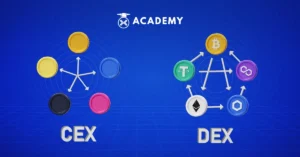In this digital age, crypto assets contained in blockchain technology have become a global phenomenon that attracts the attention of many people.
This cannot be separated since the discovery of Bitcoin as the first crypto asset in 2009 by Satoshi Nakamoto, followed by several other well-known crypto assets such as Solana, Ethereum, and other altcoins.
The centralized exchange (CEX) of cryptocurrencies is an important platform for investors and traders to enter the challenging world of cryptocurrencies and opportunities for growth.
What exactly is a centralized exchange (CEX), and what does it do? We’ll discuss more in the section below.
What is CEX (Centralized Exchange) in Crypto?
For those of you who are enthusiastic about the investment field, especially crypto, of course, you often hear and read the term “CEX.” What exactly is CEX?
CEX, or Centralized Exchange is an online place or platform as a bridge for investors and traders. The analogy is like a market that brings together sellers and buyers. Another description is like a stock exchange but in digital form.
Additionally, the operation of CEX is carried out by a centralized third party that runs the platform and ensures smooth and safe transactions between sellers and buyers.
Features of CEX (Centralized Exchange)

In its implementation, Centralized Exchange (CEX) offers various interesting features for its users. Here are some of the main features of CEX:
1. Governed by One Entity
CEX is operated and controlled by a single entity, such as a company or organization. This has several advantages:
- Fast decisions and strategy implementation: CEXs can make and implement strategies faster than decentralized DEXs.
- Easily accessible customer service: CEX provides easily accessible customer service to assist users with their queries and concerns.
- More stable and secure platform: CEX has a more robust and secure infrastructure, so the risk of downtime and errors is lower.
2. Has Various Advantages
CEX’s centralized structure results in several excellent features:
- Advanced trading tools: CEX offers a range of advanced trading tools such as margin trading, stop-loss orders, and charting tools.
- Fiat currency support: CEX allows users to deposit and withdraw fiat currencies, such as USD, EUR, and IDR.
- Efficient account management: CEX provides various features to help users manage their accounts, such as KYC (Know Your Customer) and AML (Anti-Money Laundering).
3. Other Features CEX Offers
- Staking: Users can stake their crypto assets to earn rewards.
- Margin trading: Users can borrow funds to increase their profit potential.
- Crypto derivatives: Users can trade derivative contracts based on crypto assets.
CEX Security
The safety factor is one of the fundamental things that is important for investors and traders to place funds on a centralized exchange (CEX).
Just as customers choose banking in entrusting funds, of course, they will see its safety elements, such as the potential for scams and fraud, which is also a form of cybercrime today.
The INDODAX team summarizes several things that should be of concern, including custodian wallets and know your customer (KYC).
1. Custodian Wallet
CEX utilizes custodial wallets to store users’ crypto assets. As such, CEX has the capacity and power over the wallet’s private keys.
It is worth noting, however, that this can lead to several risks, one of which is related to hacking because if CEX is hacked, the user’s assets can be stolen.
2. KYC
Every CEX requires users to perform KYC.
KYC is an identity verification process that aims to prevent criminal acts such as money laundering and terrorism financing.
How CEX Works
How exactly does the centralized exchange work? Is it linearly similar to how the financial system performs in other financial institutions?
CEX works by matching orders between its users’ buying and selling activities. Here is a brief explanation:
1. Collect & Customize Orders
- Users place orders to buy or sell crypto assets. These orders contain information such as the type of digital asset, quantity, and price terms.
- CEX collects all orders and then adjusts them based on price and time.
- The transaction can be executed when a match between the buy and sell orders exists.
2. CEX as Clearing and Custodian Partner
- CEX acts as the clearing counterparty in every transaction. As such, it plays a role in ensuring that all transactions are settled correctly.
- CEX also acts as a custodian for users’ crypto assets. CEX can store users’ crypto assets in a custodial wallet.
Pros and Cons of CEX
Centralized Exchange (CEX) offers a variety of features and services that appeal to crypto investors and traders. However, like any other platform, CEX has advantages and disadvantages.
Pros
- Security factor & is regulated is subject to strict regulations, providing a higher level of security than DEX. Example of implementation to protect user assets, such as two-factor authentication (2FA).
- CEX generally has an easy-to-understand interface, making it suitable for novice users.
- It does not require private keys, which reduces the risk of phishing and crypto asset theft. CEX is responsible for the storage and security of user assets.
- With high liquidity, CEX has a higher trading volume than DEX, making it easier for traders to find buyers and sellers for their desired crypto assets.
- Customer service that can help users solve problems or answer questions related to buying or selling digital assets.
Cons
- Elaborate KYC (Know Your Customer) and AML (Anti-Money Laundering) processes to prevent money laundering and terrorism financing.
- CEX is subject to rules and regulations in the countries where it operates. This may limit access and services available to users in some countries.
- In general, CEX charges higher transaction fees than DEX.
- CEX collects users’ data for KYC/AML purposes. This may raise privacy concerns for some users.
Does CEX (Centralized Exchange) Have Risks?
Like a double-edged sword, CEX also has some risks to be aware of, including:
1. Security Risks
CEX is a prime target for hackers because they store users’ crypto assets in custodial wallets. Hacking CEX may result in the loss of user assets.
2. Custodial Risk
When using CEX, users hand over control of their crypto assets to a third party. CEX has the potential to misuse users’ assets for personal gain.
3. Regulatory Risk
CEX is subject to rules and regulations in the countries where they operate. This may limit access and services available to users in some countries.
Which is Better: CEX or DEX?

The simple answer is that it depends on individual needs. In general, CEX and DEX are types of cryptocurrency exchanges with advantages and disadvantages.
Let’s take a closer look if the advantages of CEX include ease of use, high liquidity, and customer support. Then, the disadvantages are higher transaction fees, security risks and limited custody by regulations.
While DEX, the advantages include higher security and control, lower transaction costs, and the absence of KYC/AML. Disadvantages include less user-friendly, lower liquidity, and limited customer support.
Conclusion
A Centralized Exchange or CEX is a platform for trading a wide range of digital crypto assets that offers several benefits, for example:
- Ease of use: Suitable for beginners who are just learning crypto investment
- High liquidity: High trading volume transactions enable traders to find buyers and sellers.
- Customer service channel that can help users resolve issues.
On top of that, CEX also has some drawbacks, such as:
- Security and custodial risks: CEXs are targeted by hackers, and users hand over control of assets to third parties.
- Higher transaction fees: compared to DEXs, CEXs generally charge higher fees.
- Restricted by regulation: CEX access and services may be restricted in some countries.
When choosing CEX or DEX, it comes down to your individual needs. If you are still confused, you can consider factors such as:
- CEX is more suitable for beginners, while DEX is more suitable for more experienced crypto asset users.
- While CEX provides a wide range of trading features, DEX has more limited options.
- Remember to understand the risks and choose a platform with a good reputation and trustworthiness.
As the investment saying goes, never put your eggs in just one basket to minimize investment losses. So, diversify your assets across multiple investment platforms to reduce risk.
Speaking of Centralized Exchange, one of the well-known CEXs in Indonesia, INDODAX, is the first and most trusted place to buy and sell crypto assets in Indonesia.
At this point, you must know and understand more about CEX & DEX, right? You can also read other interesting articles about crypto and blockchain only on INDODAX Academy!








